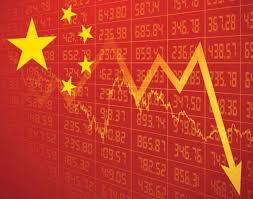
Expectations of a modest rise in retail sales in China as dashed in July with consumers deciding not to spend on retail potentially because of their continued worries of the novel coronavirus pandemic. There was also slow progress in recovery for the factory sector in the second largest economy of the world.
The disappointing set of economic indicators from China also pulled back Asian markets further raising concerns about the fragility of the recovery of the country’s economy from the hit of the pandemic, which first emerged from the country.
Following the lockdowns of large portions of its economy because of the pandemic in the first quarter of the year, which continued partially into the second quarter as well, there had been some momentum in the recovery of the Chinese economy with pent up demand, stimulus package from the government and a surprising resilience of its exports helped stage a partial recovery from the pandemic hit for the economy.
There was weaker-than-expected year-on-year industrial output growth while the decline in retail sales has continued into the seventh month straight, according to July data released by the country’s National Bureau of Statistics on Friday. There was however some firmness in property investment indicating some positive impact of the recent government stimulus for supporting the construction sector.
According to some analysts, the torrential rains that have flooded Southern China since June as well as emergence of a number of fresh outbreaks of Covid-19 leading to lockdowns was majorly responsible for the loss of momentum in the economy.
"Although there could be a modest rebound in some investment activities if the floods subside in coming months, we expect sequential recovery momentum to get weaker in H2," Nomura analysts said in a note. Factors such as receding of the pent-up demand, diminishing of chances of more policy easing and the rising United States-China tensions were cited by the note.
There was just 4.8 per cent growth in industrial output in July compared to the same period a year ago which was more or less similar to the growth in the previous month but lower than the expected growth rate of 5.1 per cent.
There was also a 1.1 per cent year on year fall in retail sales in July which was lower than analysts’ expectations of a 0.1 per cent growth. June had recorded a 1.8 per cent drop in retail sales.
Most of the retail segments, including garments, cosmetics, home appliances and furniture, reported a decline.
There was however a 12.3 per cent year on year growth in a auto sales in July compared to a 8.2 per cent fall in the previous month.
"Despite narrowing declines in investment, consumption remained weak, highlighting the lasting economic shock from the coronavirus pandemic," said Zhang Yi, chief economist at Zhonghai Shengrong Capital Management.
"Given we are likely to see a resurgence of COVID in the autumn and winter, it is not recommended that monetary policy be tightened too prematurely and fiscal policy stay insufficient."
(Source:www.businessworld.in)
The disappointing set of economic indicators from China also pulled back Asian markets further raising concerns about the fragility of the recovery of the country’s economy from the hit of the pandemic, which first emerged from the country.
Following the lockdowns of large portions of its economy because of the pandemic in the first quarter of the year, which continued partially into the second quarter as well, there had been some momentum in the recovery of the Chinese economy with pent up demand, stimulus package from the government and a surprising resilience of its exports helped stage a partial recovery from the pandemic hit for the economy.
There was weaker-than-expected year-on-year industrial output growth while the decline in retail sales has continued into the seventh month straight, according to July data released by the country’s National Bureau of Statistics on Friday. There was however some firmness in property investment indicating some positive impact of the recent government stimulus for supporting the construction sector.
According to some analysts, the torrential rains that have flooded Southern China since June as well as emergence of a number of fresh outbreaks of Covid-19 leading to lockdowns was majorly responsible for the loss of momentum in the economy.
"Although there could be a modest rebound in some investment activities if the floods subside in coming months, we expect sequential recovery momentum to get weaker in H2," Nomura analysts said in a note. Factors such as receding of the pent-up demand, diminishing of chances of more policy easing and the rising United States-China tensions were cited by the note.
There was just 4.8 per cent growth in industrial output in July compared to the same period a year ago which was more or less similar to the growth in the previous month but lower than the expected growth rate of 5.1 per cent.
There was also a 1.1 per cent year on year fall in retail sales in July which was lower than analysts’ expectations of a 0.1 per cent growth. June had recorded a 1.8 per cent drop in retail sales.
Most of the retail segments, including garments, cosmetics, home appliances and furniture, reported a decline.
There was however a 12.3 per cent year on year growth in a auto sales in July compared to a 8.2 per cent fall in the previous month.
"Despite narrowing declines in investment, consumption remained weak, highlighting the lasting economic shock from the coronavirus pandemic," said Zhang Yi, chief economist at Zhonghai Shengrong Capital Management.
"Given we are likely to see a resurgence of COVID in the autumn and winter, it is not recommended that monetary policy be tightened too prematurely and fiscal policy stay insufficient."
(Source:www.businessworld.in)





